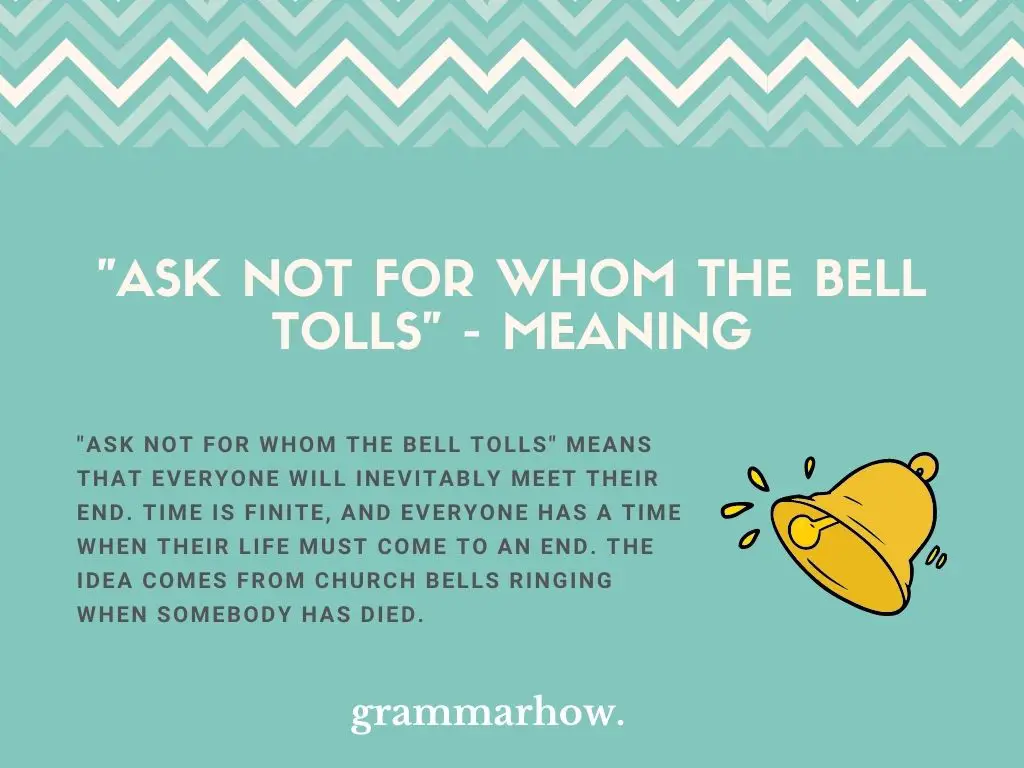English idioms can be tricky at first glance. They don’t always seem to make much sense until you write them within certain contexts. This article will explore “ask not for whom the bell tolls” and how you can get it to work.
“Ask Not For Whom The Bell Tolls” – Meaning
“Ask not for whom the bell tolls” means that everyone will inevitably meet their end. Time is finite, and everyone has a time when their life must come to an end. The idea comes from church bells ringing when somebody has died.

It was respectful not to ask who the bells were ringing for when you heard them. The implication of this phrase is that you shouldn’t ask who was dead because eventually, the bells would be ringing for you.
It is sort of an existential idiom that refers to the finality of death.
“Ask Not For Whom The Bell Tolls” – Origin
The origin of this phrase came from a 17th-century poem by John Donne. The original wording was much closer to “never send to know for whom the bell tolls,” though this ended up being synonymous with the more modern “ask not” variation.
As time goes on, English continues to develop. Even today, “ask not” is rarely used in this idiom as a phrase. Instead, people will use something more familiar. That’s where more modern variations like “do not ask for whom the bell tolls” come from.
According to Google Ngram Viewer, the phrase really gained traction in the 1930s. This doesn’t seem to follow the trend of its origin, considering it had already been out for about three centuries before this point.
The reason for this large spike in popularity was because of none other than Ernest Hemingway. Hemingway published a novel in 1940 entitled “For Whom The Bell Tolls,” which is where the largest spike came from.
Since then, it’s been a fairly common idiom for people to use when they feel like it fits.
“Ask Not For Whom The Bell Tolls” – Example Sentences
Knowing how to use “do not ask for whom the bell tolls” in a sentence is the next thing you need to learn, and you can find that out here:
- It’s such a shame to hear about that disaster! I wonder if anyone lost their life.
- Ask not for whom the bells tolls. You never really want to know the answer to that.
- I heard about what happened. I’m so sorry for your loss.
- Ask not for whom the bell tolls, and you’ll never learn that the answer will one day be you.
- What?
- I heard about what happened over there.
- Oh, yeah! I’m so glad we moved away while we had the chance.
- For whom the bell tolls, as they say.
- Do you know who’s funeral it is today? I didn’t hear much about it!
- I don’t ask for whom the bell tolls anymore. I learned my lesson the first time I did that.
- I heard about the atrocities that took place here. They were terrible, weren’t they?
- Never send to ask for whom the bell tolls. It’s not worth knowing what you might find out.
These examples come in the form of conversations because they make the most sense to explain how it works. The idiom is best used when someone has highlighted an incident or disaster that might have been out of their control.
Other Variations of “Ask Not For Whom The Bell Tolls”
There are plenty of ways to phrase this idiom. You do not have to stick to the original wording. After all, originally it was supposed to say “never send to know” rather than “ask not,” but that phrasing has since died out of common knowledge.
- Never send to know for whom the bell tolls
- Do not seek for whom the bell tolls
- Eventually, the bell will toll for you
- For whom the bell tolls
- Do not send to ask for whom the bell tolls
“Ask Not For Whom The Bell Tolls” – Synonyms
Finally, let’s go over some synonyms that cover the same idea as this idiom:
- Be careful what you wish for
- Life is finite
- That could be you one day
- Count yourself lucky it wasn’t you
- No man is an island

Martin holds a Master’s degree in Finance and International Business. He has six years of experience in professional communication with clients, executives, and colleagues. Furthermore, he has teaching experience from Aarhus University. Martin has been featured as an expert in communication and teaching on Forbes and Shopify. Read more about Martin here.
